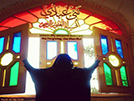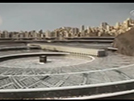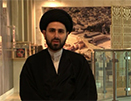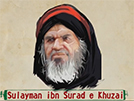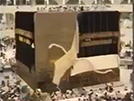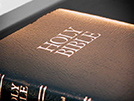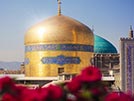Letter 12
- Details
- Hits: 3159
Letter 12
Qur'anic Proofs
Thul-Qida 1329
You, praise to Allah, have studied the Book thoroughly, becoming acquainted with both its obvious and implied meanings. Has there been anyone praised therein like the Purified `itra? Have its perfect verses described any as "purified from all uncleanness"[1] other than them? Has the verse of Purification been revealed in honour of anyone else?[2] Has the perfect Revelation commanded love for any others?[3] Has Gabriel brought the verse of Mubahala in praise of anyone else?[4]
Has "Hal Ata" been revealed in praise of others? No! I swear
By the Lord Who rightly used it for them, Who is right and fair.[5]
Are they not "Allah's Rope" concerning whom He has said: "Hold together to Allah's Rope and do not be divided (Qur'an, 3:103)"[6]? And "the truthful" concerning whom He has said: "Be ye all with the Truthful (Qur'an, 9:119);"[7] "Allah's path" about which He has said: "Do not follow different paths else they should divert you from Allah's path (Qur'an, 6:153),"[8] the ones "entrusted with authority among you (Qur'an, 4:59),"[9] the "custodians of Revelation" about whom He says: "Ask the custodians of Revelation when you do not know (Qur'an, 21:7),"[10] the believers about whom He says: "Whoever differs from the Messenger, after guidance has been made clear to him, following paths other than those of the Believers, We shall leave him in the path he has chosen and place him in Hell, what an evil refuge (Qur'an, 4:115),"[11] and the "guides" about whom He says: "You are a warner, and for each nation there is a guide"?[12] Are they not among those upon whom Allah has showered His blessings and to whom He has referred in the Fatiha and the Glorious Qur'an saying "Guide us unto the Right Path, the Path of those whom You have blessed,"[13] and He has also said: "These are with those whom Allah has blessed from among the prophets, the truthful, the martyrs and the righteous (Qur'an, 4:69)"?[14]
Has He not granted them the general authority? Has He not confined it only to them after the Prophet? Read: "Your Master is Allah and His Messenger and the Believers who uphold prayers and pay zakat even while prostrating; whoever takes for Master Allah and His Messenger and the Believers, then the Party of Allah are indeed the victorious (Qur'an, 5:58)."[15] Has He not made salvation for those who repent and do good deeds dependent upon accepting their guided authority, saying: "I am most Forgiving for those who repent, believe, do good deeds, and received guidance (Qur'an, 20:82)"[16]? Isn't their wilayat part of the "trust" about which the Almighty says: "We offered the trust unto the heavens, the earth, and the mountains, but they all refused to bear it out of extreme fear, then man bore it: he is most unjust, most ignorant (Qur'an, 33:72)"?[17]
Have they not been the "peace" wherein Allah has commanded everyone to enter, saying, "O ye who believe! Enter in peace all of you, and do not follow the steps of Satan (Qur'an, 2:208)"[18]. Are they not the "blessing" concerning whom Allah the Sublime has said, "You will be questioned on that Day about the Blessing (Qur'an, 102:8)"[19]? Has not the Messenger of Allah (pbuh) been commanded to convey all of this? Has Allah not emphasized conveying it in such a language which sounded like threatening, saying, "O Messenger! Convey that which has been revealed unto you, and if you do not do it, then you have not really conveyed His Message at all, and Allah shall protect you from (mischievous) people (Qur'an, 5:70)"?[20] Has not the Messenger of Allah, peace be upon him and his progeny, conveyed it on the Ghadir Day, having reached its plains and delivered the Message, whereupon Allah revealed this congratulating verse: "Today have I completed your religion for you, perfected My blessing unto you, and accepted Islam as your religion (Qur'an, 5:4)"?[21]
Have you noticed what your Lord did with the person who openly denied their authority saying, "O Allah! If this Message is truly from Thee, then let stones fall upon us[22] like rain from the skies, or cause a severe torment to befall upon us"? Allah hurled a Sijjil stone at him as He had done with the Fellows of the Elephant. He revealed these verses on that occasion: "A person questioned about a penalty to befall the unbelievers which cannot be warded off: (a penalty) from Allah, Lord of the Ways of Ascent (Qur'an, 70:12)."
People will cetainly be questioned about such authority when they are resurrected as indicated in the explanation of the verse saying: "And follow in their footsteps, for they have the authority (Qur'an, 37:24)."[23] There is no room to wonder any longer, then, especially when we discern the fact that their authority has been sanctioned by Allah unto people through His prophets, providing proofs and arguments for it, as indicated by the explanation of His saying: "And ask the Messengers whom We sent before thee (Qur'an, 43:45)."[24] Nay! Allah has even taken for it a promise on the Day of Alasto from the souls of His creatures even before creating their physical forms, as referred to in this verse: "When thy Lord drew forth from the children of Adam - from their loins - their descendants, making them promise, asking them: `Am I not your Lord?' They said: `Yes! We testify!' This is so lest you should say on the Day of Judgment: `Of this we were never mindful (Qur'an, 7:172)'."[25] Through their intercession has Allah granted forgiveness to Adam who learned the words of repentance referred to in Chapter 2, Verse 37, of the Holy Qur'an.[26]
"Allah does not expose them to torture,"[27] for they are the security of the inhabitants of earth and mankind's means towards Him. They are the ones of whom people are jealous and about whom Allah says: "Should they feel jealous of them because Allah Has granted them His favours (Qur'an, 4:54)"?[28] They are the ones who are "deeply grounded in knowledge" about whom He says: "Those who are deeply grounded in knowledge say: `We believe (Qur'an, 3:7)!'"[29] They are the ones who will be upon the Heights and to whom Allah refers when he says, "Upon the Heights are men who know all by their marks (Qur'an, 7:48)."[30] They are the men of truth about whom He says: "Among the Believers are men who fulfilled their promise unto Allah; some of them have passed away, while others are waiting, and they have not changed in the least (Qur'an, 33:23)."[31] They are the ones who glorify Allah continuously. About them He has said: "He is Glorified in the early morning and during the night by men who are not divered, by either trade or selling, from mentioning Allah, the saying of prayers, or the paying of zakat: they fear the Day when hearts and sights are overturned (Qur'an, 24:3637)."[32]
Their houses are the ones mentioned in Allah's verses saying: "In houses which Allah permitted to be elevated and His Name be recited therein."[33] Allah has made their niche, in Surat An-Nur (Qur'an, 24:35),[34] an example for His own Light:
Allah is the Light of the heavens and the earth. The parable of His Light is a niche, within it is a Lamp: the lamp is enclosed in glass; the glass is as (bright as) a brilliant star lit from a blessed tree, an olive, neither of the east nor of the west, whose oil is wellnigh luminous, though fire scarcely touches it: Light upon Light! Allah guides whom He will to His Light: Allah sets forth parables for men, and Allah knows all things.
They are the foremost in accepting the faith and implementing it, and they are the nearest to Allah, as He indicates in Chapter 56, verses 10 and 11.[35] They are those who testify to the Prophet's truthfulness (Qur'an, 4:69).[36] They are the martyrs and the virtuous. Regarding them and their followers has Allah said: "Among Our creation is a nation calling unto the right guidance through the truth, and they are most just therein" (Qur'an, 7:181).[37] Also, Allah has said the following about their party and about that of their enemies: "Inhabitants of the Fire are not equal to those of Paradise: inhabitants of Paradise are the victorious."[38] About both parties He has also said: "Should We treat those who believe and do good deeds as We treat those who cause corruption on earth, or should We equal the virtuous to the corrupt (Qur'an, 38:28)?"[39] He has also said the following verse concerning both parties: "Do those who commit bad deeds surmise that We will treat them like We treat those who believe and do good deeds, in life and in death? Ill is their judgment."[40] About them and their supporters He has said: "Those who believe and do good deeds are the best of creation (Qur'an, 98:7)."[41]
About them and their adversaries Allah has said: "These are two opponents who differed regarding their Lord: those who disbelieve will be clothed with clothes of fire: boiling liquid shall be poured on their heads (Qur'an, 22:19)."[42] Regarding them and their enemy, Allah has revealed these verses: "Is this who has been a believer like unto him that who has been an evildoer? They are not equal. As for those who believe and do good deeds, their abode shall be Perpetual Gardens, a reward for their good deeds. As for those who cause corruption, their abode is Hell-fire; every time they want to get out of it, they are turned back into it and is said to them: `Taste the torment of the Fire in which you disbelieved (Qur'an, 32:19 20).'"[43]
Concerning them and those who boasted of providing water for the pilgrims and looking after the Haram mosque, Allah has revealed this verse: "Do you count the providing of the pilgrims with water and the maintenance of the Haram mosque equal to (the value of) those who believe in Allah and the Last Day and fight in the Way of Allah? They are not equal in the eyes of Allah, and Allah does not lead the wrongdoers (Qur'an, 9:19)."[44]
About their triump in many trials and the magnitude of their patience, the Almighty says: "Among people is one who sells his life in return for Allah's Pleasure; Allah is Clement towards His servants (Qur'an, 2:207)."[45] Regarding their endeavour in the way of Allah and their toil, Allah has said: "Allah has traded the believers' lives for Paradise: they fight in the Way of Allah and they kill or get killed. It is His true Promise in the Torah, the Gospel and the Qur'an: who fulfills his promise better than Allah? Rejoice, therefore, for your bargain; that is the great victory. Those who turn (to Allah) in repentance, worship Him, and praise Him, wander in devotion to the Cause of Allah, bow down and prostrate in prayer, enjoin goodness and forbid evil, and observe the limits set by Allah (they do rejoice). So, proclaim the glad tidings to the Believers (Qur'an, 9:111112)." "Those who (in charity) spend of their possessions by night and by day, in secrecy and in public, have their reward with their Lord: on them there shall be no fear, nor shall they grieve (Qur'an, 2:274)."[46]
They truly say only the truth. The Truthful Himself, blessed be His Name, has borne witness to that, saying: "Those who have brought forth the truth, believing therein, are indeed the Godfearing (Qur'an, 39:33)."[47] They are the faithful relatives of the Messenger of Allah (pbuh), his kinfolk, whom Allah Has chosen for His beautiful care and great attention, saying: "And warn your near in kin (Qur'an, 26:214)." They are his relatives, and "Relatives have the priorities according to the Book of Allah" (Qur'an, 8:75; see also 33:6). On Doomsday, they will ascend to his rank and join him in the perpetual gardens of felicity as witnessed by Allah's statement:
Those who believe and whose families follow them in faith - to them shall We join their families: We shall never deprive them (of the fruit) of aught of their deeds, (yet) each is in pledge for his deeds. (Qur'an, 52:21)[48]
They have the right dues as the Qur'an has stated: "And give the near in kin his dues (Qur'an, 17:26)," and they have the fifth: nobody's responsibility will be cleared until he defrays it: "Know ye this: whatever ye obtain of spoils, its fifth goes to Allah, the Messenger, and the (Messenger's) kinfolk (Qur'an, 8:41)." They are the ones upon whom Allah's favours have been bestowed as implied in this verse: "What Allah has bestowed on His Apostle - (and taken away) from them - for this ye made no expedition with either cavalry or camelry, but Allah gives power to His apostles over any He pleases, and Allah Has power over all things (Qur'an, 59:7)."
They are Ahl alBayt addressed by Allah thus: "Allah desires to remove all abomination from you, Ahl alBayt, and purify you with a perfect purification (Qur'an, 33:33)." They are the family of Yasin whom Allah greets in the Glorious Qur'an thus: "Peace be unto the family of Yasin (Qur'an, 37:130)."[49] And they are the family of Muhammad upon whom greetings and peace have been enforced by Allah Who says: "Allah and His angels send greetings unto the Prophet: O ye who believe! Send greetings unto him and many salutations (Qur'an, 33:56)."[50]
Some people asked the Prophet, peace be upon him and his progeny, "O Messenger of Allah! We know how to greet you with peace, but how can we greet you with prayers?" He, Allah's peace and blessings be upon him and his progeny, answered, "Say: `O Allah! Send blessings unto Muhammad and the family of Muhammad,'" according to the hadith. It was then understood then that greeting them was part of the prayers enjoined by this verse. This is why learned men have included the verse quoted above among others in their praise. Ibn Hajar has listed it in part 11 of his Al-Sawa`iq al-Muhriqa among verses in their praise,[51] peace be upon them. A good resort for them and a good reward: Gardens of Eden with gates wide open to receive them.[52]
Who can compete with them? In the sun is meaning and heat,
Parching, exerting the one who dares to compete.
Allah has chosen them for His favours, and they are the ones who are faster than all others in doing good deeds; they inherit the Book of Allah; about them He has said the following therein: "Among men is one who wrongs his own self (by ignoring the Imams), and one who seeks righteousness (by following the Imams), and one who is faster than others in doing good deeds by the Will of Allah (who is the Imam himself): this indeed is Allah's great favour (Qur'an, 35:32)."[53]
These verses which demonstrate the Imams' virtues and merits must suffice. Ibn `Abbas has said: "In praise of `Ali alone, three hundred verses were revealed."[54] Others say that one fourth of the Holy Qur'an has been revealed in their praise. This comes as no surprise when we consider the fact that they and the Qur'an are twin brothers who do not separate from one another.
Be satisfied for now with what we have stated here of the perfect verses of the Holy Qur'an. Take them easily going and returning, making the advent of morning beams, easily and nicely, forgiving and at ease, from someone very well acquainted therewith, for none can tell you better than one endowed with experience, and peace be with you.
Sincerely,
Sh
-----------------------------------
[1] As it ruled in its departure therefrom according to the Almighty's statement: "Allah wishes to remove all abomination from you, members of Ahl al-Bayt (as) and purify you with a perfect purification (Qur'an, 33:33)."
[2] Nay! Nobody else can claim that at all. They have been selected for it; so, nobody can reach their station nor dream of attaining their achievements.
[3] Nay! Allah has selected them for it and preferred them over all others, saying: "Say (O Muhammad): `I do not ask you for any reward other than being kind to my kin,' and whoever attains a good deed [being kind to them], We shall certainly increase him in goodness; verily, Allah is Forgiving [to those who are kind to them], Appreciative [of such kindness] (Qur'an, 42:23)."
[4] Nay! The verse of Mubahala was revealed specifically in their praise. Allah, the Dear One, says therein: "Say (O Muhammad): `Let us bring our sons and your sons,... (Qur'an, 3:61)."
[5] This is a reference to the revelation of Ayat al-`Asr (Chapter of Time) regarding them and their foes, and whoever wishes to be familiar with this matter as dealt with in the verse of purification, verse of mubahala, the verse enjoining kindness to the Prophet's kin, and the verse of time, he must refer to our own statement in this regard, for it is the remedy for every ailment. It brings the foes back to their senses, and it provides knowledge for those who do not know, and praise be to Allah.
[6] In his commentary on the meaning of this verse in his Al-Tafsir al-Kabir, Imam al-Tha`labi quotes Aban ibn Taghlib reporting that Imam Ja`fer al-Sadiq (as) has said: "We are Allah's rope about which He has said: `And uphold Allah's rope all of you together, and do not be separated (Qur'an, 3:103)'." Ibn Hajar has included this verse among others revealed in their praise, being the fifth in the series of verses which he enumerates in Chapter 11 of Al-Sawa`iq al-Muhriqa. While explaining its meaning, the author quotes al-Tha`labi, as you have heard above, citing Imam Ja`fer al-Sadiq (as). Imam al-Shafi`i is quoted in Rashfatul Sadi by Imam Abu Bakr ibn Shihabud-Din as having said:
When I saw people being carried away to the seas of misguidance and ignorance by their sects,
I boarded, in the Name of Allah, the Ark of Salvation, that is, the Household of the Chosen One, the Seal of Prophets.
And I upheld Allah's Rope, and it is obedience to them, as He has commanded us to uphold to the Rope.
[7] The "truthful" here are Allah's Messengers and the Imams of his purified progeny, according to our consecutive sahihs, and as supported by al-Hafiz Abu Na`im and Muwaffaq ibn Ahmed, and transmitted by Ibn Hajar in his explanation of Chapter 5, Section 11, of Al-Sawa`iq al-Muhriqa, page 90, quoting Imam Zaynul `Abidin (as) in a statement quoted above (see Letter No. 6).
[8] Imams al-Baqir and al-Sadiq (as) used to always say: "The RIGHT PATH here is the Imam, and do not follow diverse paths (imams of misguidance) for they will divert you from His Path (and we are His Path)."
[9] In his authentic sahih, the trusted authority of Muslims, Muhammad ibn Ya`qub al-Kulayni, has quoted Burayd al-`Ajli saying: "I asked Abu Ja`fer (Imam Muhammad al-Baqir, as) about the verse saying: `Obey Allah, and obey the Messenger and those charged with authority among you (Qur'an, 4:59),' and he answered me by saying: `Have you not observed those (Jews) who are given a portion of the (knowledge of the) Book? They are invited to the Book of Allah so that it might decide between them, then a party among them turns back (therefrom), and they withdraw (Qur'an, 3:23),' how they believe in sorcerers and tyrants instead, and how they say to those who disbelieve that they are closer to the Straight Path than the Believers? They tell the imams of misguidance and the callers unto the Fire that their guidance is more accurate than that of Muhammad's progeny; `Have you not seen those to whom a portion of the Book has been given? They believe in idols and false deities and say of those who disbelieve: These are better guided in the path than those who believe. Those are they whom Allah has cursed, and whoever Allah curses, you shall never find for them any helper. Or have they a share in the kingdom? But then they would not give people even the speck in a date stone (Qur'an, 4:51-53),' nor will they ever own aught of Allah's domain, that is, Imamate and Caliphate, `... or do they envy the people for what Allah has bestowed upon them of His own favours (Qur'an, 4:54)?' We are the ones who are envied because of the Imamate which Allah has bestowed upon us rather than anyone else among His creation; `We bestowed upon the descendants of Ibrahim (Abraham) the Book and the Wisdom, and We provided them with a great kingdom (Qur'an, 4:54),' meaning He made some of them messengers, prophets, and imams; so, how can they recognize its existence to the descendants of Ibrahim while denying it to the descendants of Muhammad (pbuh)?!" "Among them are those who believed in it, and among them are those who turned away therefrom, and Hell suffices for a torment (Qur'an, 4:55)."
[10] Explaining this chapter, al-Tha`labi quotes Jabir saying the following in his book Al-Tafsir al-Kabir: "When this Chapter was revealed, `Ali (as) said: `We are the people of remembrance,' and this is the case with all the Imams of guidance." The Bahraini scholar has quoted in Chapter 35 more than twenty authentic ahadith bearing this meaning.
[11] Ibn Mardawayh, in his explanation of this Chapter, has indicated that "... to argue with the Messenger" in this context means to dispute with him regarding `Ali (as), and the guidance referred to in the verse "... after guidance has been made manifest to him" is the guidance provided by `Ali, peace be upon him." In his Tafsir, al-`Ayyashi states something almost similar to this, and the sahihs are consecutive from the sources of the purified progeny in stating that "the path of the believers" is the path of their own (progeny), peace be upon them.
[12] Explaining this verse in Al-Tafsir al-Kabir, al-Tha`labi quotes Ibn `Abbas saying: "When this verse was revealed, the Messenger of Allah (pbuh) put his hand over his chest and said: `I am the warner and `Ali (as) is the guide, and through you, O `Ali, guidance is achieved.'" Many scholars of exegesis and authors of books of traditions quote Ibn `Abbas and Muhammad ibn Muslim saying: "I asked Abu `Abdullah (Imam Ja`fer al-Sadiq (as)) about the implications of this verse and he answered: `Each Imam is the guide of his time.' Imam Abu Ja`fer al-Baqir has said the following regarding its explanation: `The warner is the Messenger of Allah, and the guide is `Ali,' then he adds: `By Allah, imamate shall remain with us till the Hour approaches.'"
[13] In his exegesis of Surat al-Fatiha, al-Tha`labi, in his Al-Tafsir al-Kabir, quotes Abu Buraydah saying that "al-sirat al-mustaqim (the Straight Path) is the path of Muhammad (pbuh) and his progeny (as)." Interpreting this sura, Waki` ibn al-Jarirah quotes Sufyan al-Thawri through a chain of narrators including al-Sadi, Asht, Mujahid, all quoting Ibn `Abbas saying: "`Guide us to the Straight Path' means `Guide us to the love for Muhammad and his progeny.'"
[14] The Imams from among Ahl al-Bayt (as) are without any argument the masters of siddiqs, martyrs, and the righteous.
[15] Scholars of exegesis are unanimous, as al-Qawshaji, imam of the Ash`aris, has admitted in his chapter on "Sharh al-Tajrid," saying that this verse was revealed in honour of `Ali (as) when he offered charity while engaged in the ceremonial supplication performing the prayers. In his sahih, al-Nisa'i quotes `Abdullah ibn Salam testifying to its revelation in honour of `Ali (as). This view is supported by the author of Al-Jami` Baynal Sihah al-Sitta while explaining Surat al-Ma'ida [Chapter of Table of Viands]. Al-Tha`labi has indicated its revelation in honour of the Commander of the Faithful in his book Al-Tafsir al-Kabir, as we will explain when we discuss it.
[16] In Chapter 11, Part One, of his Al-Sawa`iq al-Muhriqa, Ibn Hajar states: "The guidance referred to in Chapter 8 which states: `I am all-Forgiving for those who repent, believe, and do good deeds, then seek guidance,' according to Thabit al-Banni, means the seeking of guidance from the household of the Prophet (pbuh).'" This is narrated from Abu Ja`fer al-Baqir, too. Ibn Hajar has narrated several ahadith testifying to the salvation of those who seek and act upon their guidance, peace be upon them. He also refers to what he quotes from al-Baqir's statement referring to the conversation between Imam al-Baqir (as) and al-Harith ibn Yahya in which the Imam says: "O Harith! Have you not seen how Allah has made it clear that repentance, belief, and good deeds are not sufficient without seeking guidance from our authority?' then he, peace be upon him, quotes his grandfather the Commander of the Faithful saying: "By Allah! If a man repents, believes, and does good deeds, but he does not seek guidance from our authority, nor recognizes our rights, all of these things will be utterly in vain.'" Abu Na`im the hafiz quotes Awn ibn Abu Jahufah who in turn quotes his father narrating a similar tradition from `Ali (as). Al-Hakim has published similar ahadith from Imams al-Baqir and al-Sadiq (as), and from Thabit al-Banni and Anas ibn Malik.
[17] Refer to the meaning of this verse in Al-Safi, and in `Ali ibn Ibrahim's Tafsir, and to the traditions narrated by Sunnis explaining its meaning as compiled by the Bahraini scholar in Chapter 115 of his work Ghayat al-Maram.
[18] In chapter 224 of Ghayat al-Maram, the Bahraini scholar quotes twelve traditions from our sahihs testifying to the fact that this verse was revealed regarding `Ali's government and that of the Imams among his descendants, barring the leadership of all others. In Chapter 223, he states that al-Asfahani al-Amawi narrates the same about `Ali (as) quoting various sources.
[19] In Chapter 48 of his Ghayat al-Maram, the Bahraini scholar quotes three ahadith narrated by Sunnis testifying to the fact that the "bliss" here is what Allah has blessed people through the government of His Messenger (pbuh), that of the Commander of the Faithful and Ahl al-Bayt (as). In Chapter 49, he quotes twelve ahadith from our sahihs reflecting the same; so, refer to it if you wish.
[20] Only one Sunni faqih among the authors of books of traditions, namely Imam al-Wahidi, while commenting on Surat al-Ma'ida in his book Asbab al-Nuzul, quotes Abu Sa`id al-Khudri saying: "This verse was revealed on the Day of Ghadir Khumm in honour of `Ali ibn Abu Talib (as)." Imam al-Tha`labi has included it in his Tafsir from two sources, and al-Hamawani al-Shafi`i includes it in his Fara'id from various sources from Abu Hurayrah, and it is transmitted by Abu Na`im in his book Nuzul al-Qur'an from two sources: Abu Rafi` and al-A`mash, both quoting `Atiyyah. In Ghyat al-Maram, there are nine ahadith narrated by Sunnis and eight authentic ones by Shi`as conveying the same meaning; so, refer to it in Chapters 37 and 38.
[21] This text is stated by Imam Abu Ja`fer al-Baqir (as), succeeded in narrating it by Imam Abu `Abdullah al-Sadiq (as). According to authentic narrations, Sunnis have included six ahadith in their own books of traditions that in the end quote the Messenger of Allah, peace be upon him and his progeny, quite clearly emphasizing this very theme. Its explanation exists in Chapters 39 and 40 of Ghayat al-Maram.
[22] Imam al-Tha`labi has detailed the explanation of this matter in his Al-Tafsir al-Kabir, and it is transmitted by the Egyptian scholar al-Shiblinji who details `Ali's biography in his book Nur al-Absar, page 171, where he, too, explains it in detail. Al-Halabi mentions it at the conclusion of his chapter "Hijjatul Wada`" in Vol. 3 of his book Al-Sira al-Halabiyya. Al-Hakim narrates it in "Tafsir al-Ma`arij" in his Al-Mustadrak, page 502, Vol. 2.
[23] Al-Daylami, as is the case with the explanation of this verse in Al-Sawa`iq al-Muhriqa states that Sa`id al-Khudri quotes the Prophet (pbuh) saying: "Follow in their footsteps, for they are responsible concerning `Ali's wilayat." Al-Wahidi, as is the case with the author of Al-Sawa`iq al-Muhriqa, explains this verse by saying: "It has been narrated regarding Allah's statement: `Follow in their footsteps, for they are responsible...,' that the responsibility referred to here is regarding `Ali's government and that of Ahl al-Bayt (as),'" adding: "For Allah commanded His Prophet (pbuh) to make people aware of the fact that he does not ask them for any rewards for conveying His Message other than being kind to his kin..., that is, they will be asked if they properly submitted to their wilayat as the Prophet (pbuh) had instructed them, or if they lost it and discarded it, thus becoming subject to Allah's demands and the consequences of such discarding." Ibn Hajar includes it in Chapter 11 of his Al-Sawa`iq al-Muhriqa among the verses revealed in their praise, being number 4 in such sequence, and he elaborates on it a great deal.
[24] Refer to what Abu Na`im al-Hafiz has quoted in his Hilyat al-Awliya, and to what is recorded by al-Tha`labi, al-Nisaburi, and al-Barqi regarding its meaning in their own tafsir books, and to what Ibrahim ibn Muhammad al-Hamawini and other Sunnis have said. Also refer to what Abu `Ali al-Tibrisi has said while explaining its meaning in his book Mujma`ul Bayan fi Tafsir al-Qur'an, quoting the Commander of the Faithful (as). What Chapters 44 and 45 of Ghayat al-Maram state in this meaning is something that dispels all doubts.
[25] Our own discourse about Ahl al-Bayt (as), while explaining this verse, testifies to this fact.
[26] Ibn al-Maghazli al-Shafi`i quotes Ibn `Abbas saying: "When the Messenger of Allah, peace be upon him and his progeny, was asked about the words which Adam had received from his Lord and whereby his repentance was accepted, he (pbuh) said: `He [Adam] asked Him by the prestige He held for Muhammad, `Ali, Fatima, al-Hasan, and al-Husayn, and thus did He accept his repentance and forgive him.'" This is what we know for a fact to be the meaning of this verse.
[27] Refer to Al-Sawa`iq al-Muhriqa by Ibn Hajar who interprets the verse of the Almighty: "Allah would not torment them..." as verse 7 of those revealed in their honour as recorded in Chapter 11 of the said book where the author endorses our own view stated here.
[28] This is admitted by Ibn Hajar who counts this verse among the ones revealed in their honour, numbering it 6 in Chapter 11 of his Al-Sawa`iq al-Muhriqa. Ibn al-Maghazli al-Shafi`i, as indicated in the explanation of this verse in Al-Sawa`iq al-Muhriqa, quotes Imam al-Baqir (as) saying: "By Allah, we are the ones who are envied." In Chapters 60 and 61 of Ghayat al-Maram, as many as thirty authentic ahadith are recorded in this meaning.
[29] This is quoted by Thiqatul-Islam Muhammad ibn Ya`qub al-Kulayni who quotes an authentic hadith from Imam al-Sadiq (as) saying: "We are a people the obedience to whom has been mandated by Allah, the Exalted and the Sublime; we are the ones who are deeply rooted in knowledge, and we are the ones who are envied. Allah Almighty has said: `Or should they envy (certain) people for what Allah has granted them out of His own favour?'" This has also been quoted by al-Shaykh in his Tahthib, also quoting Imam al-Sadiq, peace be upon him.
[30] While explaining this verse in his Tafsir, al-Tha`labi quotes Ibn `Abbas saying: "The `a`raf' is an elevated place of the Sirat whereupon al-`Abbas, Hamzah, `Ali and Ja`fer of the two wings identify the ones who love them by the sign of the whiteness of their countenance, and the ones who hate them by its blackness." Al-Hakim, too, has quoted `Ali (as) saying: "We shall stand, on the Day of Judgment, between Paradise and Hell, and we shall recognize those who support us by their mark and would let them enter Paradise, and we shall recognize those who hate us also by their marks." Salman al-Farisi is quoted saying: "I have heard the Messenger of Allah, peace be upon him and his progeny, saying: `O `Ali! You and the wasis from your descendants are on the A`raf.'" This is supported by the hadith quoted by Dar Qutni at the conclusion of Part Two, Chapter 9, of Al-Sawa`iq al-Muhriqa. It indicates that `Ali (as) delivered a lengthy address to the six persons assigned by `Umer to be in charge of the shura in which he stated: "I ask you in the Name of Allah if anyone among you has been told similarly to what I was told by the Messenger of Allah, peace be upon him and his progeny, and that is: `O `Ali! You are the one who will designate the destination of every person on the Day of Judgment either to Paradise or to Hell'?" They responded: "No, indeed." Ibn Hajar states the following: "The meaning of this hadith is what is narrated by Antarah from Imam `Ali al-Rida (as) who quotes the Prophet, peace be upon him and his progeny, saying the following to `Ali (as): `O `Ali! You are the one who will assign people to either Paradise or Hell on the Day of Judgment, telling Hell which one is hers and which one is not.'" Ibn Hajar says: "Ibn al-Sammak narrates that Abu Bakr has said to `Ali (as), may Allah be pleased with both men, "I have heard the Messenger of Allah saying: `Nobody can pass on the Sirat except the one permitted by `Ali.'"
[31] In Section 5, Chapter 9, of Al-Sawa`iq al-Muhriqa, Ibn Hajar, while discussing `Ali's assassination, indicates that when `Ali (as) was on the pulpit in Kufa, he was asked to explain the verse in which this phrase occurs: "Men who proved truthful to their promise to Allah," and he answered by saying: "O Lord! Forgive them; this verse was revealed in honour of myself, my uncle Hamzah, and my cousin `Ubaydah ibn alHarith ibn alMuttalib. `Ubaydah died a martyr in Badr; Hamzah died a martyr on Uhud; as to myself, I am awaiting a most painful death, when this shall be drenched from the blood of this," pointing with his hand to his beard and head respectively; "It is a true promise made to me by my beloved Father of alQasim, peace be upon him and his progeny." AlHakim, while interpreting this verse as quoted in al-Tibrisi's Mujma`ul Bayan fi Tafsir al-Qur'an, cites `Umer ibn Thabit quoting Abu Ishaq quoting `Ali, peace be upon him, saying: "On our own behalf was this verse revealed: `Men who proved truthful to their promise to Allah...,' and I by Allah am waiting, and I have never changed aught."
[32] Mujahid and Ya`qub ibn Sufyan quote Ibn `Abbas's interpretation of the verse saying "And when they see trade or amusement, they rush to it, leaving you standing (for prayers alone)," thus: "Dahyah alKalbi once came from Syria on a Friday with a merchandise of foodstuff and he came to a place called Ahjar alZayt where he announced his presence by beating drums to invite people to him. People, therefore, rushed to him, leaving the Prophet (pbuh) standing on the pulpit preaching with only `Ali, alHasan, alHusayn, Fatima, Salman, Abu Tharr, and alMiqdad. The Prophet (pbuh) then said: `Allah has cast a look at my mosque on a Friday, and had it not been for the presence of these persons, He would have set the city on fire and hurled stones at its inhabitants as He did with the people of Lut.' Allah has revealed in honour of those who remained with the Messenger of Allah at the mosque the verse saying: `Praising Him therein, during the night and at early dawn, men whom neither trade nor sale can divert.'"
[33] Al-Tha`labi, while discussing the meaning of this verse in his Al-Tafsir al-Kabir, quotes Anas ibn Malik and Burayd saying: "The Messenger of Allah (pbuh) once read the verse saying `... in houses which Allah has desired that they should be elevated, and His Name shall be mentioned therein,' whereupon Abu Bakr stood up and said: `O Messenger of Allah! Is this house (then he pointed to the house where `Ali and Fatima where living) among them?' The Prophet (pbuh) answered: `Yes; one of their choicest." In Chapter 12 of Ghayat al-Maram, there are nine authentic ahadith through which the light of dawn shines.
[34] This is a reference to the verse saying: "The similitude of His Light is a Lamp..." Ibn al-Maghazli al-Shafi`i has quoted `Ali ibn Ja`fer in his Manaqib saying: "I asked the father of al-Hasan (Imam al-Kazim, peace be upon him) about the verse saying `... like a niche wherein a lamp...,' and he, peace be upon him, answered: `The niche is Fatima, the Lamp symbolizes al-Hasan and al-Husayn, and `the glass is like a shining star,' indicates that Fatima shone like a star among all the women of the world, receiving its fuel from a blessed tree, the family-tree of Ibrahim (Abraham), neither of the east nor of the west, neither Jewish nor Christian, `its oil almost shines (by itself),' indicates that knowledge almost speaks of itself even when no fire touches it, `light upon light,' wherein there is one Imam after anoother, `Allah guides whomsoever He pleases to His Light,' implies that Allah guides to our wilayat whomsoever He pleases.'" Suffices such an interpretation to be coming from a member of the household upon whom the revelation descended.
[35] Al-Daylami, as in hadith 29, Part Two, Section 9, of Al-Sawa`iq al-Muhriqa by Ibn Hajar, quotes `Ayesha, al-Tabrani, Ibn Mardawayh, all citing Ibn `Abbas saying that the Prophet (pbuh) has said: "The foremost in believing in the Prophets are three men: Joshua son of Nun who was the foremost in believing in Moses (as); the one referred to in Chapter Yasin who was the foremost in believing in Christ (as), and the foremost in believing in Muhammad is `Ali ibn Abu Talib (as)." This hadith is quoted by al-Muwaffaq ibn Ahmed and the faqih Ibn al-Maghazli, both quoting Ibn `Abbas.
[36] Ibn al-Najjar, as in hadith 30 referred to in Al-Sawa`iq al-Muhriqa quotes Ibn `Abbas saying that the Messenger of Allah (pbuh) has said: "The siddiqs are three: Ezekiel, who was the foremost to believe [in Moses] from among the descendants of Pharaoh; Habib al-Najjar, who is referred to in Chapter Yasin, and `Ali ibn Abu Talib (as)." Abu Na`im and Ibn `Asakir, as in hadith 31 referred to in Al-Sawa`iq al-Muhriqa quotes Ibn Abu Layla saying that the Messenger of Allah (pbuh) has said: "The siddiqs are three: Habib al-Najjar, the believer referred to in Chapter Ali Yasin as saying: `O my people, follow the Messengers;' Ezekiel, who was the foremost to believe [in Moses] from among the descendants of Pharaoh, who said: `Do you kill a man just for saying that his Lord is Allah?' and `Ali ibn Abu Talib (as), who is the best of them.'" Sahihs are consecutively reported in stating that he is the supreme siddiq and the greatest faruq.
[37] The most distinguished among Sunni Imams, namely Muwaffaq ibn Ahmed, has quoted Abu Bakr ibn Mardawayh citing `Ali (as) saying: "This nation will be divided into seventy-three groups; with the exception of one, all the rest will go to Hell; this (lucky) group is the one in whose honour Allah, the Exalted and the omni-Scient, has said: `Among those whom We have created is a group that guides towards righteousness, and through righteousness (alone) do they achieve equity,' and they include me and my Shi`as."
[38] In his Amali, Shaykh al-Tusi correctly quotes the Commander of the Faithful saying that the Messenger of Allah, peace be upon him and his progeny, once recited the following verse: "The companions of the Fire are not equal to those who are the companions of Paradise," whereupon he explained saying: "The companions of Paradise are those who have followed me and recognized the authority of `Ali ibn Abu Talib (as) after me." He was asked: "What about the companions of the Fire?" He answered: "These include the ones who are dissatisfied with his (`Ali's) government, those who shall violate the covenant and fight him after my demise." This hadith is quoted by al-Saduq from `Ali, peace be upon him. Abul-Mu'ayyad Muwaffaq ibn Ahmed has quoted Jabir saying that the Messenger of Allah, peace be upon him and his progeny, has said: "By the One in whose hands my soul is, this (`Ali) and his Shi`as are the winners on the Day of Judgment."
[39] Refer to the meaning of this verse in `Ali ibn Ibrahim's tafsir if you wish, or Chapters 81 and 82 of Ghayat al-Maram.
[40] This verse descended to honor al-Hamzah, `Ali (as), and `Ubaydah who came out to battle `Utbah, Shaybah, and al-Walid. The believers are Hamzah, `Ali (as), and `Ubaydah, and the ones who committed wrong deeds are `Utbah, Shaybah, and al-Walid. There are many authentic ahadith supporting this argument.
[41] Suffices you for proof the fact that Ibn Hajar has admitted its revelation in their own honor, counting it among the verses in their favour, numbering it 11 among such verses in Part One, Chapter 11, of his Al-Sawa`iq al-Muhriqa; so, refer to it to see the verses we have quoted in reference to this verse in the chapter dealing with Sunnis giving credence to Shi`as in our book Al-Fusul al-Muhimma.
[42] Al-Bukhari, in his explanation of the Qur'anic Chapter dealing with hajj, on page 107, Vol. 3, of his sahih, quotes `Ali (as) saying: "I am the first to kneel down to submit a complaint before Allah on the Day of Judgment." Al-Bukhari then quotes Qays saying: "On their behalf this verse was revealed: `These are two opponents who have brought their case before their Lord.' They are the ones who came out on Badr to battle `Ali (as) and his two companions, Hamzah and `Ubaydah, namely Shaybah ibn Rabi`ah and his two fellows `Utbah ibn Rabi`ah and al-Walid ibn `Utbah." On the same page, he quotes Abu Tharr saying that he used to swear by the verse referring to the two opponents who disputed about their Lord which was revealed in honour of `Ali (as) and two of his companions, and about `Utbah and both of his companions when they came out to duel at Badr.
[43] This verse was revealed on behalf of the Commander of the Faithful (as) versus al-Walid ibn `Uqbah ibn Abu Ma`it, without any argument. This is ascertained by traditionists and endorsed by scholars of exegesis. Imam Abul-Hasan `Ali ibn Ahmed al-Wahidi, while discussind this verse in his book Asbab a-Nuzul, quotes Sa`id ibn Jubayr citing Ibn `Abbas saying that al-Walid ibn `Uqbah ibn Abu Ma`it once said to `Ali ibn Abu Talib (as): "I am stronger than you; my speech is more eloquent, and I am faster than you in raising an army." `Ali (as) said: "Say no more, for you are none other than a debauchee," whereupon the verse "Is that who is a believer similar to that who is a debauchee? They certainly are not alike," was revealed, describing `Ali (as) as the believer and al-Walid ibn `Uqbah as the debauchee.
[44] This verse was revealed in honour of `Ali (as), his uncle al-`Abbas, and Talhah ibn Shaybah who started thus bragging: "I am in charge of the House (Ka`ba); I have its keys, and mine is its covering cloth." Al-`Abbas said: "I am the one in charge of siqaya and maintenance." `Ali (as) said: "I do not know what you both say, for I have said my prayers in the company of the one [Prophet Muhammad, pbuh] who leads the jihad six months prior to anyone else among all people," whereupon Allah revealed the verse cited above. This is stated by Imam al-Wahidi while explaining the meaning of this verse in his book Asbab al-Nuzul citing al-Hasan al-Basri, al-Sha`bi, and al-Qurtubi. He also quotes Ibn Sirin and Murrah al-Hamadani saying that `Ali (as) said the following to al-`Abbas once: "Aren't you going to migrate? Aren't you going to join the Messenger of Allah, peace be upon him and his progeny?" He answered: "Do not I have a responsibility that is superior to the migration? Do not I provide water to the pilgrims of the House of Allah and maintain its Haram?" whereupon this verse was revealed.
[45] On page 4, Vol. 3, of his Al-Mustadrak, al-Hakim quotes Ibn `Abbas saying: "`Ali has bartered his own life and has, indeed, put on the Prophet's garb." Al-Hakim testifies to the authenticity of this hadith according to the endorsement of both Shaykhs, although the latter did not narrate it themselves. In his Talkhis al-Mustadrak, al-Hakim admits the same on the said page, quoting Imam `Ali ibn al-Husain (as) saying: "The first to barter his life for the Pleasure of Allah is `Ali ibn Abu Talib (as) who slept in the bed of the Messenger of Allah (pbuh)," then he quoted a few verses of poetry attributed to `Ali (as) beginning with these:
I have safeguarded with my own life and strength
That of the best who walked on the surface of earth,
And circled the Ancient House, though alone,
And also around the [Black] Stone.
[46] Traditionists, scholars of exegesis, and authors who have written about the causes of revelation of the Holy Qur'an have all quoted Ibn `Abbas explaining the verse reading: "Those who spend their wealth in charity at night, during the day, in secrecy, and in the open," by saying: "This verse was revealed in honour of `Ali ibn Abu Talib (as) who had once in his possession four dirhams; he spent one of them in the Cause of Allah at night, one during the day, one in secrecy, and in public also one; therefore, this verse was revealed to appreciate what he did." Imam al-Wahidi, too, has quoted this hadith of Ibn `Abbas in his book Asbabul-Nuzul. He also quotes Mujahid narrating it, and he transmits it from al-Kalbi in more detail.
[47] The one who has brought forth the truth is the Messenger of Allah, and the one who has believed therein is the Commander of the Faithful (as), according to the hadith of al-Baqir, al-Sadiq, al-Kazim, al-Rida, peace be upon all of them, as well as by Ibn `Abbas, Ibn al-hanafiyyah, `Abdullah ibn al-Hasan, the martyred Zayd ibn `Ali ibn al-Husayn, and `Ali ibn Ja`fer al-Sadiq (as). The Commander of the Faithful used to use this verse as a testimonial. Ibn al-Maghazli, in his Manaqib, quotes Mujahid saying: "The one who has brought the truth is Muhammad (pbuh), and the one who has believed in him is `Ali (as)." Both huffaz, that is, Ibn Mardawayh and Abu Na`im, have quoted it, and so have others.
[48] In his exegesis of Surat al-Tur on page 468, Vol. 2, of his authentic Al-Mustadrak, al-Hakim quotes Ibn `Abbas paraphrasing the verse reading: "And those who believe and whose families follow them in faith, to them shall We join their families: nor shall We deprive them (of the fruit) of aught of their good deeds; yet each individual is pawned to what deeds he has done," by saying: "Allah shall elevate the status of a believer's descendants so that they would be able to join him in Paradise, even if they may be in a lower station," then he recited the same verse again and said: "Allah says He will not decrease their rewards aught."
[49] This is the third verse of the ones enumerated by Ibn Hajar in Chapter 11 of his Al-Sawa`iq al-Muhriqa. The author goes on to say that a group of scholars of exegesis have quoted Ibn `Abbas saying: "The implication of this verse is to send salutations unto Muhammad's Progeny (as)." Ibn Hajar says that al-Kalbi, too, has given it the same meaning, then he adds: "Al-Fakhr al-Razi has stated that the Prophet's Progeny constitutes his [`Ali's] peer in five instances: Allah has greeted him by saying: `Peace be unto you, O Messenger, and unto the Progeny of Yasin,' in sending prayers unto him and them in tashahhud, sadaqa, and tahara, when the Almighty says: `Taha,' that is, tahir, purified, and: `... purifies you with a perfect purification;' in loving them, saying: `Follow me so that Allah may love you,' and also: `Say: I do not ask you for any reward other than being kind to my kin.'"
[50] Al-Bukhari has quoted it in his tafsir of the holy Qur'an, in Vol. 3 of his Sahih, in a chapter dealing with the verse "Allah and His angels send salutations unto Muhammad," in his exegesis of Surat al-Ahzab. It is also quoted by Muslim in a chapter on sending greetings unto the Prophet (pbuh) in his book on prayers in Vol. 1 of his Sahih, and it is quoted by all traditionists from Ka`b ibn `Ajrah.
[51] Refer to the second of these verses on page 87.
[52] Al-Tha`labi, while discussing its meaning in his Al-Tafsir al-Kabir, quotes hadith in which the Messenger of Allhh, peace be upon him and his progeny, says: "Tuba is a tree in Paradise whose root is in my home and whose branch overshadows the residents of Paradise." Some people asked: "O Messenger of Allah! We have asked you before about it, and you told us that its root is in `Ali's home and its branch is above the residents of Paradise," whereupon he, peace be upon him and his progeny, said: "Aren't my home and `Ali's the same?"
[53] Thiqatul-Islam al-Kulayni has quoted in an authentic hadith Salim saying that he once asked Abu Ja`fer (Imam al-Baqir) about the meaning of the verse: "Then We let those whom We have selected from among Our servants inherit the Book." The Imam, peace be upon him, explained it as follows: "The one who rushes to do good deeds is the Imam; the one who is moderate is the one who knows the value of the Imam; and the one who does injustice to his own self is the one who is not aware of the significance of the Imam." Something similar to this is cited from Imams Abu `Abdullah al-Sadiq (as), Abul-Hasan al-Kazim, and Abul-Hasan al-Rida, peace be upon them, who are quoted by al-Saduq and by many others among our narrators. Ibn Mardawayh quotes `Ali (as) explaining this verse thus: "The ones implied in this verse are we," and the details are available in our book Tanzil al-Ayat, as well as in Ghayat al-Maram.
[54] This is quoted by Ibn `Asakir from Ibn `Abbas, as stated in Section 3, Chapter 9, page 76, of Al-Sawa`iq al-Muhriqa.


